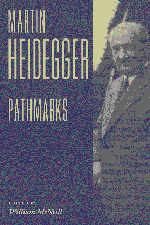Book contents
- Frontmatter
- Dedication
- Contents
- Editor's Preface
- Preface to the German Edition
- Comments on Karl Jaspers's Psychology of Worldviews (1919/21)
- Phenomenology and Theology (1927)
- From the Last Marburg Lecture Course (1928)
- What Is Metaphysics? (1929)
- On the Essence of Ground (1929)
- On the Essence of Truth (1930)
- Plato's Doctrine of Truth (1931/32, 1940)
- On the Essence and Concept of Φύσιζ in Aristotle's Physics B, I (1939)
- Postscript to “What Is Metaphysics?” (1943)
- Letter on “Humanism” (1946)
- Introduction to “What Is Metaphysics?” (1949)
- On the Question of Being (1955)
- Hegel and the Greeks (1958)
- Kant's Thesis about Being (1961)
- Notes
- References
- Editor's Postscript to the German Edition
Comments on Karl Jaspers's Psychology of Worldviews (1919/21)
- Frontmatter
- Dedication
- Contents
- Editor's Preface
- Preface to the German Edition
- Comments on Karl Jaspers's Psychology of Worldviews (1919/21)
- Phenomenology and Theology (1927)
- From the Last Marburg Lecture Course (1928)
- What Is Metaphysics? (1929)
- On the Essence of Ground (1929)
- On the Essence of Truth (1930)
- Plato's Doctrine of Truth (1931/32, 1940)
- On the Essence and Concept of Φύσιζ in Aristotle's Physics B, I (1939)
- Postscript to “What Is Metaphysics?” (1943)
- Letter on “Humanism” (1946)
- Introduction to “What Is Metaphysics?” (1949)
- On the Question of Being (1955)
- Hegel and the Greeks (1958)
- Kant's Thesis about Being (1961)
- Notes
- References
- Editor's Postscript to the German Edition
Summary
A “fitting” orientation for a positive and illuminating critical review of this work published by Jaspers is not available in the current inventory of our scientific and philosophical knowledge. Making such an admission right at the outset may serve as an appropriate indication of the originality and significance of Jaspers's achievement. This critical review will attempt to orient itself in a fitting manner to the immanent intentions of Jaspers's work and follow up on them. Some preliminary reflections on the scope of this course of inquiry and on the range of its claims will also help us to characterize the actual object to be dealt with in the following comments, and will thus be far from an otiose discussion of possible methods.
Jaspers's work developed out of a concern with psychology as a whole (5), and psychology is supposed to allow us to see “what the human being is” (ibid.). The psychology of worldviews, which is a “part” of the whole of psychology with its own specific nature and function, attempts to mark out the “limits of our psychical life,” and thereby provide a clear and comprehensive horizon for our psychical life. Marking out such limits is, more precisely, a type of observation in which we comprehensively examine the being of the human mind in its substantial totality and classify its ultimate positions.
- Type
- Chapter
- Information
- Pathmarks , pp. 1 - 38Publisher: Cambridge University PressPrint publication year: 1998



